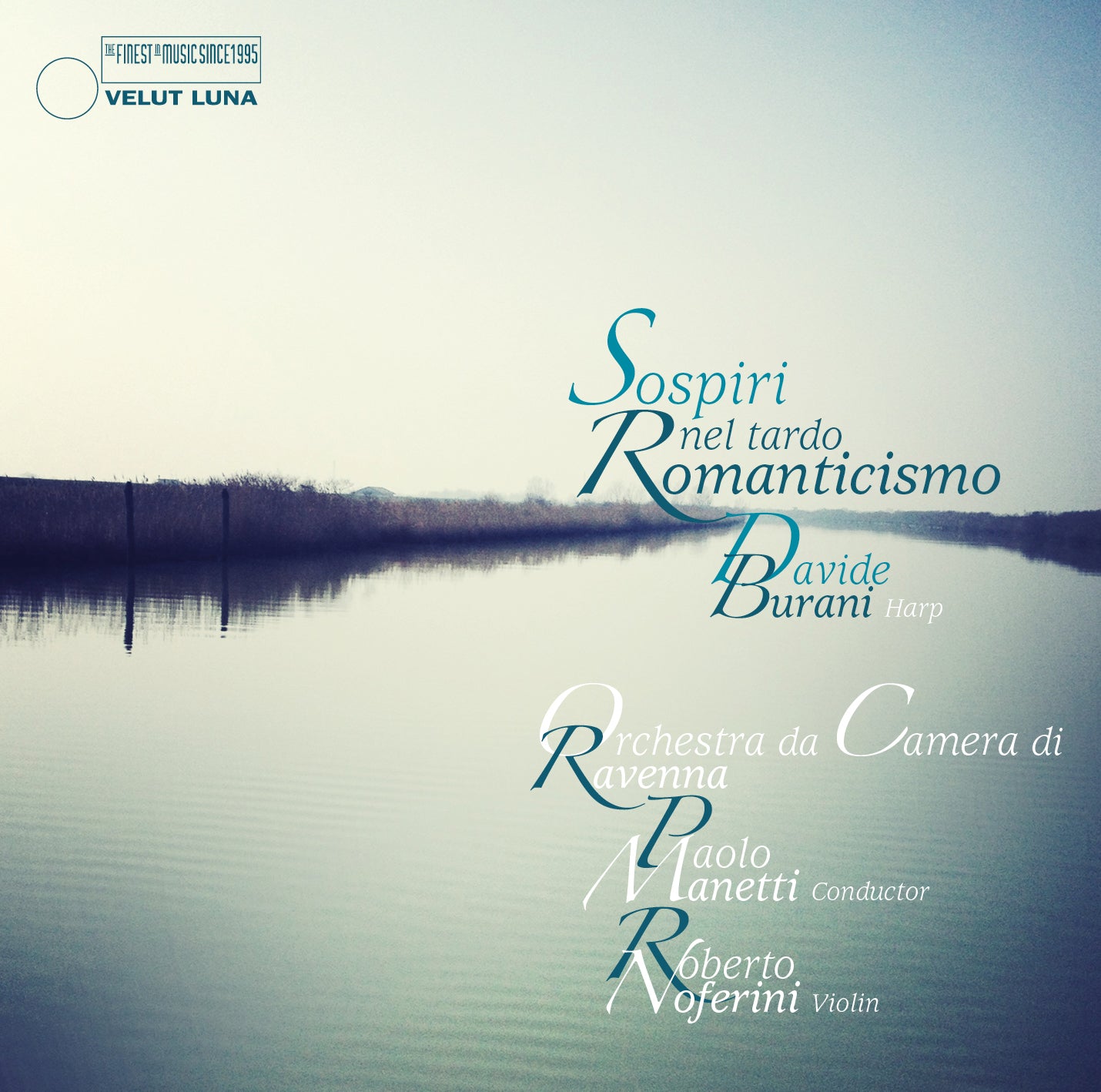Velut Luna
SOSPIRI NEL TARDO ROMANTICISMO - Burani, Orchestra da Camera di Ravenna; Manetti; Noferini
SOSPIRI NEL TARDO ROMANTICISMO - Burani, Orchestra da Camera di Ravenna; Manetti; Noferini
Genere musicale: Classica
Disponibile
Impossibile caricare la disponibilità di ritiro
SOSPIRI NEL TARDO ROMANTICISMO (CVLD239)
Autore: AAVV
Esecutore: Davide Burani: Harp; Orchestra da Camera di Ravenna; Paolo Manetti : Conductor; Roberto Noferini: Violin
Disponibile in: File HD, CD
Production: Velut Luna
Recording: Marco Lincetto
Editing: Mattia Zanatta
Stereo Mix & mastering: Marco Lincetto
Critical text: Iole Di Gregorio
Layout: L’Image
Marketing & Sales Manager: Patrizia Pagiaro
Tracce
01 - Claude Debussy: Danses - Danse sacrée
02 - Claude Debussy: Danses - Danse profane
03 - Edward Elgar: Elegy op 58
04 - Edward Elgar: Sospiri op 70
05 - Giovanni Caramiello: Duetto sulla Casta Diva del Bellini (trasc per arpa sola di D Burani)
06 - Jules Massenet: Méditation de Thaïs
07 - Luigi Maurizio Tedeschi: Fantasia op 48
08 - Luigi Maurizio Tedeschi: Elegia op 22
09 - Marcel Grandjany: Aria in classic style
10 - Jean Sibelius: Andante festivo op postuma
Note
Arpa e archi insieme nel romanticismo
Iole Di Gregorio
La sensibilità romantica portò a concepire l’idea melodica come indissolubilmente legata alla voce specifica di uno strumento, che ne determina il modo in cui vibra e si ripercuote nell’anima. Pur essendo il timbro l’elemento primigenio, alogico e istintivo della musica, gli autori fino al Settecento avevano dato la priorità ad altri elementi della composizione. La nuova attenzione al “suono in sé” alimentò la trasformazione delle tecniche esecutive degli archi e la ricerca di originali impasti timbrici in orchestra, il perfezionamento di strumenti tradizionali e di nuova invenzione, la valorizzazione di strumenti antichi quanto carichi di memorie, come l’arpa. Dietro l’arpa moderna, inventata da Sebastian Erard nel 1811 e dotata di 47 corde e 7 pedali, non si stenta a scorgere lo strumento le cui origini si confondono nel mito e che, con animo positivista, possiamo rintracciare fino alle prime applicazioni dell’homo faber.
Nel corso dell’Ottocento romantico, in ambito di preferenza francese –già alle soglie della Rivoluzione l’arpa era lo strumento prediletto dalla regina Maria Antonietta– assistiamo alla progressiva integrazione dell’arpa nell’organico orchestrale, consacrata dal trattato di Hector Berlioz. Contemporaneamente si stabilizza l’uso dell’arpa nel teatro d’opera, come testimonia il raffinato impasto timbrico della Meditation, tratta da Thaïs di Jules Massenet (1842 – 1912). Suggestive e ricche di fascino si ritrovano tracce del mondo operistico nelle composizioni di Giovanni Caramiello (1838 – 1938), per molti anni acclamato arpista del Teatro S. Carlo di Napoli, autore di un Duetto sulla casta Diva del Bellini, per arpa e pianoforte, qui offerto nella trascrizione per arpa sola di Davide Burani.
Lo sfruttamento dell’arpa culmina nella produzione sinfonica di Claude Debussy (1862 – 1918), che spesso inserisce due arpe in partitura e fa largo uso di glissandi per creare una sonorità impressionistica. Le Danses sacrée et profane gli furono commissionate nel 1904 dalla Casa Pleyel che intendeva promuovere un nuovo modello di arpa “cromatica” in concorrenza alla suddetta arpa diatonica, monopolio della firma Erard. Il nuovo strumento non riuscì ad imporsi, ma le Danses di Debussy possono, fortunatamente, essere eseguite con l’arpa a pedali grazie alla trascrizione di Henriette Renié, celebre docente e concertista francese. Fin dalla prima esecuzione, avvenuta il 6 novembre 1904 ai Concerts Colonne di Parigi, le Danses hanno creato un modello di riferimento per i compositori europei, in grado di esercitare un’influenza paragonabile a quella dell’Adagietto della Quinta di Mahler del 1902, rievocato nel pezzo sciolto Sospiri op. 70, composto nel 1914 per archi e arpa dal compositore inglese sir Edward Elgar (1857 – 1934), cui si devono alcuni capisaldi della letteratura per orchestra d’archi tardo romantica. Marcel Grandjany (1892 – 1974), arpista e compositore americano di origine francese, formatosi al Conservatorio di Parigi, dedica nel 1937 l’Aria in classic style all’insieme di arpa e archi, confermando la solidità di quest’unione e la persistenza del gusto arpistico francese nel mondo.
Share

-

Spedizioni prodotti fisici
Spedizioni gratuite in Europa (UE), a partire da 4 articoli - Richiedere quatozione per i costi di spedizione per i paesi non UE
-

Consegna prodotti digitali
La consegna dei prodotti digitali avverrà direttamente sul sito e riceverai anche una email con il link per il download dei file.
-

Scrivi una recensione
Qui sopra puoi scrivere una recensione sul prodotto che hai acquistato, saremo felici di conoscere la tua opinione.


